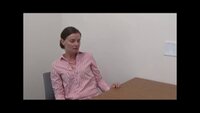| Title |
Bowsher, Kim, OH19_083 |
| Creator |
Weber State University, Stewart Library: Oral History Program. |
| Contributors |
Bowsher, Kim, Interviewee; Chadwick, Alexa, Interviewer; Story, Sarah, Video Technician |
| Description |
The Beyond Suffrage Project was initiated to examine the impact women have had on northern Utah. Weber State University explored and documented women past and present who have influenced the history of the community, the development of education, and are bringing the area forward for the next generation. The project looked at how the 19th Amendment gave women a voice and representation, and was the catalyst for the way women became involved in the progress of the local area. The project examines the 50 years (1870-1920) before the amendment, the decades to follow and how women are making history today. |
| Abstract |
The following is an oral history interview with Kim Bowsher, conducted on May 30, 2019, in the Stewart Library, by Sarah Storey. Kim discusses her life, her memories, and the impact of the 19th Amendment. Alexa Chadwick, the video technician, is also present during this interview.; The following is a video clip from an oral history interview with Kim Bowsher, conducted on May 30, 2019. In this video clip, Kim provides her personal definition of courage. |
| Image Captions |
Kim Bowsher Circa 2019; Kim Bowsher speaking about her definition of courage |
| Subject |
Voting--United States; Women--suffrage; Women--Rights of women |
| Keywords |
Weber State University; Universities and colleges; History Degree; Ogden--Junior League; Ogden--Downtown Alliance; Ogden--Historic 25th Street Association |
| Digital Publisher |
Stewart Library, Weber State University, Ogden, Utah, United States of America |
| Date |
2019 |
| Date Digital |
2019 |
| Temporal Coverage |
1986; 1987; 1988; 1989; 1990; 1991; 1992; 1993; 1994; 1995; 1996; 1997; 1998; 1999; 2000; 2001; 2002; 2003; 2004; 2005; 2006; 2007; 2008; 2009; 2010; 2011; 2012; 2013; 2014; 2015; 2016; 2017; 2018; 2019 |
| Medium |
oral histories (literary genre) |
| Spatial Coverage |
Ogden, Weber County, Utah, United States, http://sws.geonames.org/11788968, 41.22809, -111.96766; City of Seattle, King, Washington, United States, http://sws.geonames.org/5809844, 47.60621, -122.33207 |
| Type |
Text; Image/StillImage; Image/MovingImage |
| Access Extent |
37 page PDF; Video clip is an mp4 file, 165 MB |
| Conversion Specifications |
Filmed using a Sony HDR-CX430V digital video camera. Sound was recorded with a Sony ECM-AW3(T) bluetooth microphone. Transcribed using Express Scribe Transcription Software Pro 6.10 Copyright NCH Software. |
| Language |
eng |
| Rights |
Materials may be used for non-profit and educational purposes, please credit University Archives; Weber State University; Music from Uppbeat (free for Creators!): https://uppbeat.io/t/yeti-music/gentle-breeze; License code: IWGKRYG7XHQOMZY0; Music from Uppbeat (free for Creators!): https://uppbeat.io/t/simon-folwar/hope; License code: KYI5VLB63GF1TXND |
| Source |
Bowsher, Kim OH19_083 Weber State University Archives |
| Format |
application/pdf; video/mp4 |
| ARK |
ark:/87278/s6a8srtv |
| Setname |
wsu_bs_oh |
| ID |
105490 |
| Reference URL |
https://digital.weber.edu/ark:/87278/s6a8srtv |
| Title |
Bowsher, Kim, OH19_083 |
| Creator |
Weber State University, Stewart Library: Oral History Program. |
| Contributors |
Bowsher, Kim, Interviewee; Chadwick, Alexa, Interviewer; Story, Sarah, Video Technician |
| Description |
The Beyond Suffrage Project was initiated to examine the impact women have had on northern Utah. Weber State University explored and documented women past and present who have influenced the history of the community, the development of education, and are bringing the area forward for the next generation. The project looked at how the 19th Amendment gave women a voice and representation, and was the catalyst for the way women became involved in the progress of the local area. The project examines the 50 years (1870-1920) before the amendment, the decades to follow and how women are making history today. |
| Abstract |
The following is an oral history interview with Kim Bowsher, conducted on May 30, 2019, in the Stewart Library, by Sarah Storey. Kim discusses her life, her memories, and the impact of the 19th Amendment. Alexa Chadwick, the video technician, is also present during this interview. |
| Image Captions |
Kim Bowsher Circa 2019 |
| Subject |
Voting--United States; Women--suffrage; Women--Rights of women |
| Keywords |
Weber State University; Universities and colleges; History Degree; Ogden--Junior League; Ogden--Downtown Alliance; Ogden--Historic 25th Street Association |
| Digital Publisher |
Stewart Library, Weber State University, Ogden, Utah, United States of America |
| Date Digital |
2019 |
| Temporal Coverage |
1986; 1987; 1988; 1989; 1990; 1991; 1992; 1993; 1994; 1995; 1996; 1997; 1998; 1999; 2000; 2001; 2002; 2003; 2004; 2005; 2006; 2007; 2008; 2009; 2010; 2011; 2012; 2013; 2014; 2015; 2016; 2017; 2018; 2019 |
| Medium |
oral histories (literary genre) |
| Spatial Coverage |
Ogden, Weber County, Utah, United States, http://sws.geonames.org/11788968, 41.22809, -111.96766; City of Seattle, King, Washington, United States, http://sws.geonames.org/5809844, 47.60621, -122.33207 |
| Type |
Text; Image/StillImage |
| Access Extent |
37 page PDF |
| Language |
eng |
| Rights |
Materials may be used for non-profit and educational purposes, please credit University Archives; Weber State University |
| Source |
Bowsher, Kim OH19_083 Weber State University Archives |
| Format |
application/pdf |
| Setname |
wsu_bs_oh |
| ID |
105669 |
| Reference URL |
https://digital.weber.edu/ark:/87278/s6a8srtv/105669 |





